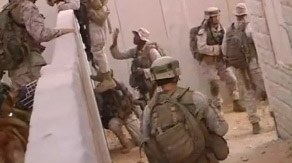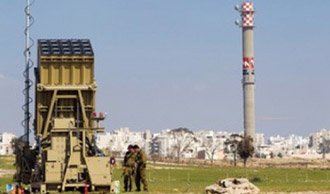U.S.-Israel Joint Training on the Increase, Missile Defense Cooperation Accelerates
By JINSA Policy Director James Colbert
By JINSA Policy Director James Colbert
The Israel Defense Force’s two premier training bases recently saw some 200 U.S. Marines spend a month improving their counter-terror and urban combat skills alongside Israeli troops. At nearly the same time, the U.S. Army announced that in May 2012 it intends to hold Austere Challenge, one of the largest joint exercises in the history of the two countries that will take place in Israel. Just as significant, the annual U.S.-Israel Juniper Cobra missile defense exercises will take place just before the joint IDF-U.S. Army exercise.
U.S. Marines Train in Israel
As part of the ongoing cooperation between IDF ground forces and the U.S. Marine Corps, a company from the U.S. Marine Corps’ Security Force Regiment, a dedicated security and anti-/counter-terrorism unit, came to Israel in July for a month of intensive training alongside IDF soldiers at IDF facilities.
In Israel, the Marines split their time between the Adam Base in central Israel, the home of the Israeli Counter Terror School and facilities for close combat skills development and advanced shooting and sniper development, and the Tze’elim Base near Beersheba which is equipped with a large mock city used for urban warfare training known as the Urban Warfare Training Center (UWTC).
The IDF Engineer Corps built the module city with a city center, hospital, grand mosque, local shops, paved roads and hundreds of structures including multi-story buildings. Constructed to simulate an urban battle environment, the force-on-force training facility provides realistic training for combat in a variety of urban scenarios.
Video of U.S. Marines training in Israel can be seen below:
The Marines were reportedly part of the Fleet Antiterrorism Security Teams (FAST) that guard high-value naval installations, most notably those containing nuclear vessels and weapons, and provide back up to Marine units at threatened U.S. embassies.
At the Tze’elim UWTC, USMC Platoon Sgt. Robert Hattenbach told the Jerusalem Post, “We’ve never been to a mock town like that of the IDF.”
The Marines were thrilled to train at the city, enthusiastically describing its realistic feel. “It’s important for our soldiers to train in different sites, preparing them for anything,” Hattenbach told the Post.
“By training here, we can better combat terrorism in any area and field,” U.S. Navy Hospital Corpsman Raymond Price elaborated. “Coming to Israel has been an inspirational trip. It’s beautiful to see how Israel has managed to preserve so many years of history, culture and tradition.”
 “This trip was a serious wake up call,” Hattenbach told the IDF Spokesperson’s Office. The instructors at the Adam Base took the time to explain to us what’s been going on in Israel and we realized that Israeli people are just like us. We now better understand what Israel really is and when we go back to the U.S. we can tell people that.
“This trip was a serious wake up call,” Hattenbach told the IDF Spokesperson’s Office. The instructors at the Adam Base took the time to explain to us what’s been going on in Israel and we realized that Israeli people are just like us. We now better understand what Israel really is and when we go back to the U.S. we can tell people that.
During exercises that involved IDF forces, the Marines were impressed by their Israeli counterparts. At the Adam base’s counter terror center, USMC Corporal Lombard told the Post, “The tactics used by the snipers and special forces are much more efficient…They also focus more on the safety of each individual soldier rather than the mission.”
In related news, the IDF just announced that it intends to switch IDF combat uniforms to the same type as worn by U.S. Marines. The main difference is that the new uniforms are wrinkle-free, have extra pockets, more breathing holes and Velcro at the chest and shoulder for name and unit patches.
Austere Challenge – U.S. Army and IDF Joint Exercise
The U.S. Army, seeking to increase cooperation with the IDF, will hold one of the largest joint exercises in the two nations’ history in 2012. Lieutenant General Mark Hertling, Commander of U.S. Army Europe, told the Jerusalem Post that the IDF and the U.S. Army would hold a massive ground forces exercise in Spring 2012 that will be part of the multi-phase Austere Challenge exercise series conducted by the U.S. European Command (EUCOM). Israel is part of EUCOM’s area of responsibility. Despite its location, pressure from Arab states has kept Israel from inclusion in U.S. Central Command (CENTCOM) which stretches from Egypt to Kazakhstan and includes Israel’s neighbors Jordan, Syria and Lebanon.
Austere Challenge will be the largest joint exercise between the two forces ever held and will feature the establishment of American command posts in Israel and IDF command posts at EUCOM headquarters in Germany. It was reported that the ultimate goal of the exercise would be to allow for the establishing of joint task forces in the event of a future large-scale conflict in the Middle East. “We are looking to increase relations and to expand training,” Hertling told the Post following a meeting with Maj. Gen. Sami Turgeman, commander of IDF Ground Forces Command.
Also, Generals Hertling and Turgeman reportedly discussed the possibility of sending IDF officers to U.S. Army training schools in Germany, where an Israeli officer would serve on the faculty of the school and share his experiences with new recruits training ahead of deployment. Furthermore, Hertling expressed specific interest in sending American soldiers to Israel to study at the IDF sniper school located at the Adam Military Base where U.S. Marines recently trained (see above).
Hertling told the Post that while he anticipated cuts to the U.S. Army’s budget, he did not believe it would have an effect on joint-training programs with the IDF. “We will have to look at some things, but in the short term we are in good shape,” he said.
Hertling said that he discussed with Turgeman some of the lessons the IDF learned from the Second Lebanon War in 2006 against Hezbollah, and how the intifada affected the military ahead of the war. He said that the United States faced a similar challenge after nearly a decade of conducting counter-insurgency operations in Afghanistan and Iraq. “Israel came out of the intifada like we are coming out of the counter-insurgency environment,” he said. “We see the same thing, which is the need to continue to train.”
 Juniper Cobra Strikes Again – Joint Missile Defense Grows
Juniper Cobra Strikes Again – Joint Missile Defense Grows
Shortly before Austere Challenge, scheduled for May, EUCOM will carry out in Israel the Juniper Cobra joint missile defense exercise, a nearly annual event last held in October 2009. The exercise will allow U.S. and Israeli crews to better coordinate their efforts and further integrate their systems. The exercise gains more importance with each passing year as Iran continues its march toward nuclear weapons production.
The Israeli Air Force’s Air Defense Division, the United States Missile Defense Agency and EUCOM have held the Juniper Cobra exercise for the past five years. The 2012 iteration, planned to be one of the most complex and extensive yet, will include Israel’s Arrow 2 and Iron Dome systems as well as the U.S. Army’s Terminal High Altitude Area Defense (THAAD) system and the U.S. Navy’s ship-based Aegis Ballistic Missile Defense System. The exercise is expected to include the actual launching of interceptors from these systems at target missiles.
The Arrow, the world’s only operational, purpose-built ballistic missile interceptor system, is the product of a far-reaching joint U.S.-Israel research, development and production program. Due in part to generous funding provided by the U.S. Congress over the past 17 years, Israel is the only country today employing operational defensive systems capable of intercepting rockets and missiles of different types and ranges.
Boeing assembles critical Arrow 2 system components at its facilities in Alabama. Other major American partners to the Arrow program are General Dynamics in Nebraska, L3 Ordinance in Ohio, GW Lisk in New York, and Honeywell in Minnesota. Boeing is currently working jointly on production development of the latest generation Arrow 3 interceptor and will be a cooperative partner in the Arrow 3’s production along with Arrow program prime contractor Israel Aerospace Industries.
U.S. and Israel Protecting the Region
In June, Lieutenant General Patrick J. O’Reilly, Director for the Pentagon’s Missile Defense Agency, said that the multi-layered defense system being developed by Israel – comprised of Iron Dome and Magic Wand systems on the lower levels and the Arrow 2 and Arrow 3 systems on the atmospheric level and above – will strengthen the ability of the United States to protect its forces in the Middle East, according to Ha’aretz. In the interview, O’Reilly reportedly intimated that the Israeli missile batteries might also protect Arab countries who are allies of the U.S. but with which Israel has no diplomatic ties.
In early August, EUCOM’s air commander Gen. Mark Welsh, USAF, visited Israel for talks with Israel Air Force commander Maj.-Gen. Ido Nehushtan, which focused also on the upcoming missile defense exercise.
“Juniper Cobra shows us how to defend not only with Israeli assets but also with American assets,” Arieh Herzog, head of the Defense Ministry’s Missile Defense Agency, said on July 25 at the 2nd Annual Israel Multinational Missile Defense Conference near Tel Aviv, according to the Post.
Frank A. Rose, Deputy Assistant Secretary of State for Space and Defense Policy, told conference attendees that the Pentagon planned to deploy a second Aegis missile defense ship in the Mediterranean Sea alongside the cruiser USS Monterey (CG-61), which is already deployed in the region. According to a transcript of his remarks provided by the State Department, he also said the United States was looking to deploy an advanced transportable AN/TPY-2 X-Band radar – similar to the one provided to Israel in 2008 – in southern Europe.
“Together we can work to protect what our adversaries would put at risk, both now and in the future,” Rose continued. “Our mutual commitment to cooperation on missile defense research and development, on deploying proven technologies and weapon systems such as the Arrow, and on gaining operational experience through joint exercises and training, will go far in enhancing Israeli security and our mutual interests, and in further cementing and expanding our partnership.”
Israel Aerospace Industries Vice President Marketing Yair Ramati said at the conference that Israel was accelerating development of the Arrow 3, which is intended to serve as the upper tier missile defense system against Iran’s long-range ballistic missiles. The Arrow-3 is expected to become operational in 2015 and its first flight test is expected toward the end of 2011.